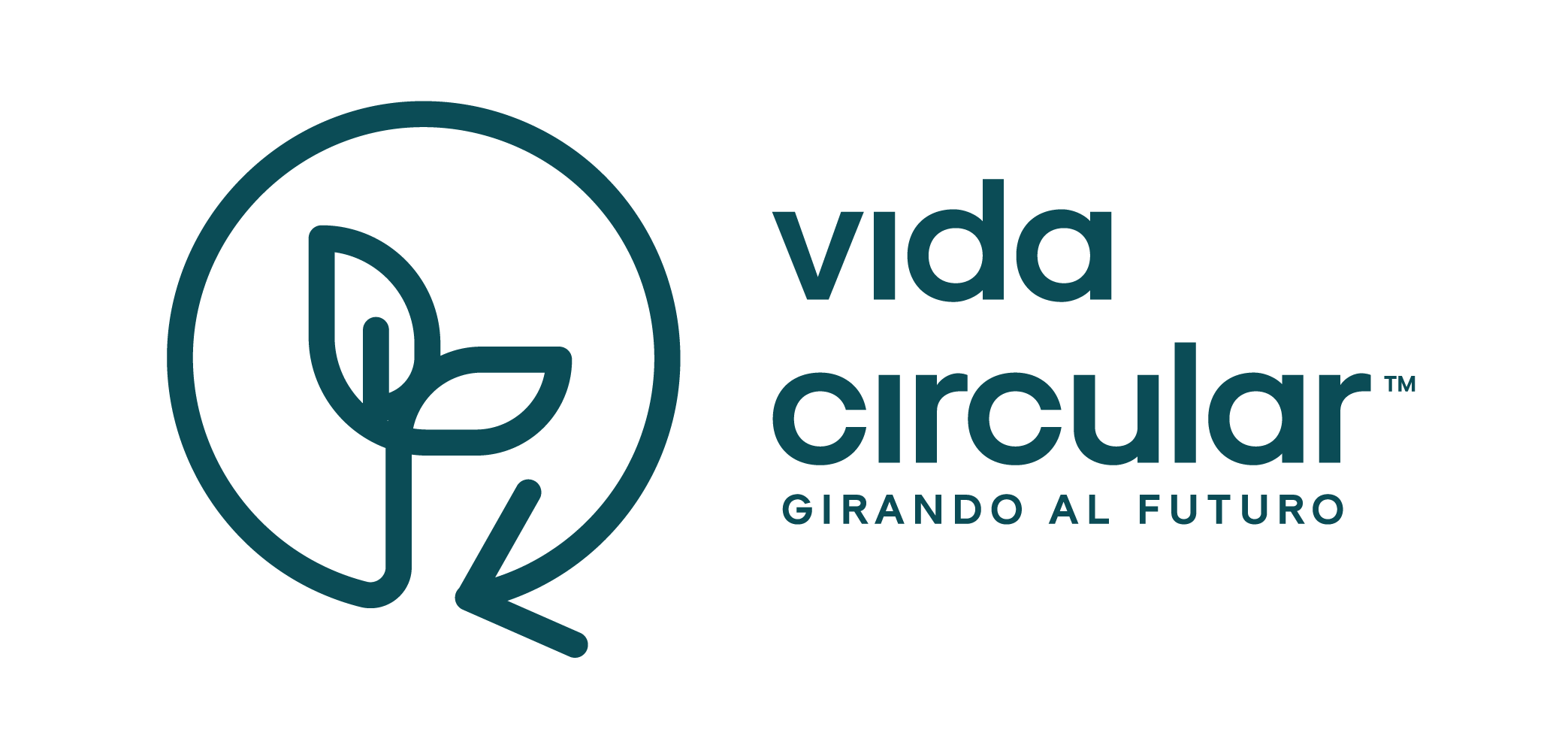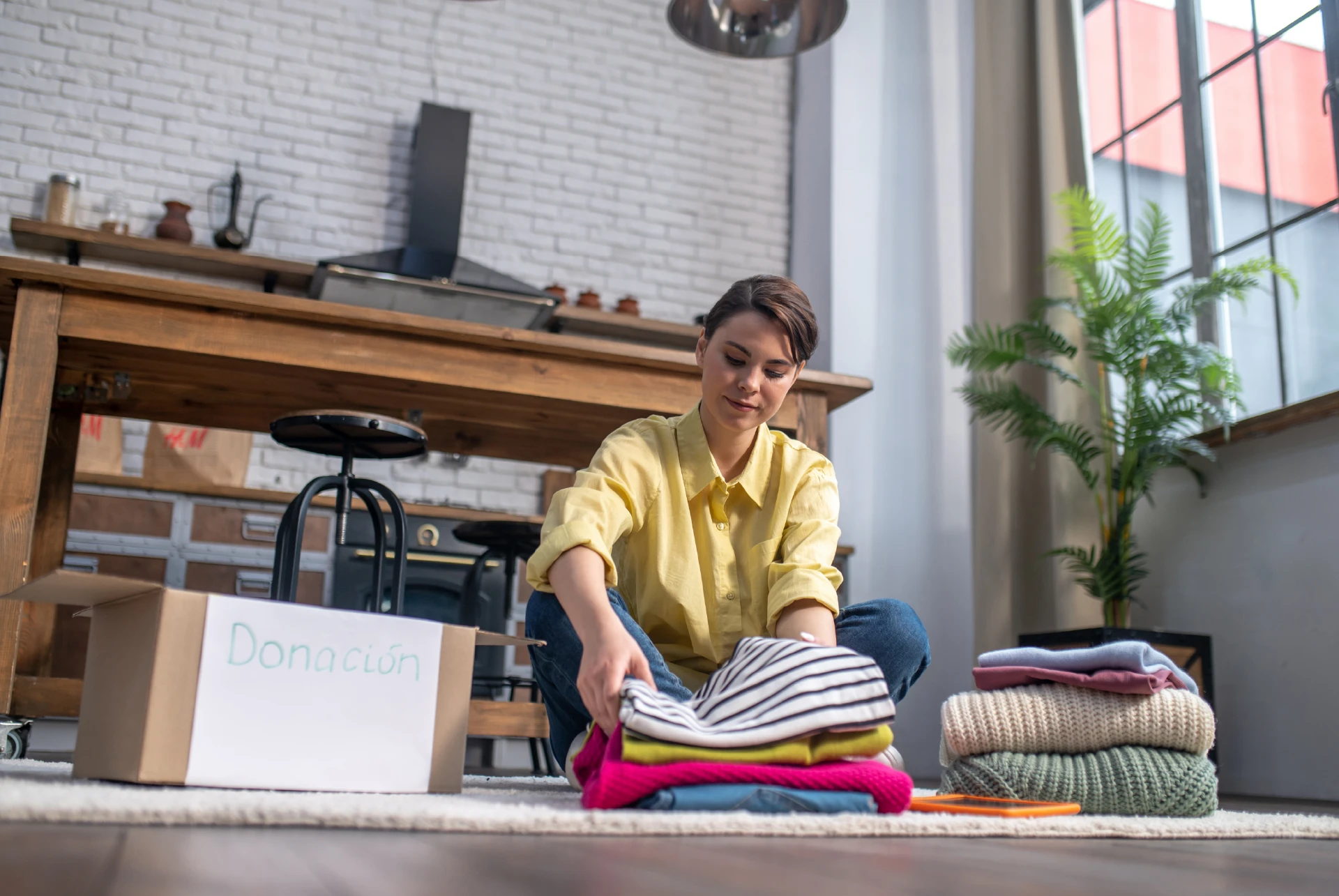
Decluttering as a conscious action to take care of the environment
We accumulate things, ideas and commitments without realizing it, and decluttering helps us free up space, reduce stress and focus on what really matters. But it's not just about tidying up; it's about making space, both physically and mentally, for what does add up in our lives.
Decluttering means letting go of the unnecessary, freeing ourselves from what takes energy, time and money. It is not only an external cleaning, but also an inner cleaning, a form of wellness that helps us to live with more clarity and tranquility. In the end, its essence is simple: let go to be happier.
How decluttering helps the environment
When we declutter, we are not only tidying up our home, we are also making decisions that can benefit the planet. By reducing consumption, reusing and reflecting on what we really need, we help reduce the amount of waste and the environmental impact of our way of life. Here's how:
- Reduces consumption and overproduction
By letting go of what you don't need, you become more aware of what you actually use. This helps you avoid impulse purchases and reduce the demand for unnecessary products. Less production means less use of natural resources, less energy consumed and less waste generated.
- Promotes reuse and recycling
Many things you no longer use can have a second life in someone else's hands. Instead of throwing them away, you can donate, give them away or sell them, extending their time of use and preventing them from ending up in a landfill. In addition, separating and correctly recycling materials such as paper, glass or plastics helps to close the waste cycle.
- Promotes more conscious consumption
Decluttering is not only about getting rid of things, but also about changing the way we consume. By reflecting on what we really need, we learn to make better choices, opting for more durable, reusable and sustainable products.
- Reduces pollution
Every product we buy has an environmental footprint: from the extraction of raw materials to their manufacture and transportation. By consuming less and making better use of what we already have, we reduce production demand and, with it, emissions of greenhouse gases and other pollutants.
Decluttering not only brings personal benefits, it is also a step towards a more responsible lifestyle for the planet. Tidying up your space can be a simple but powerful way to help the environment!
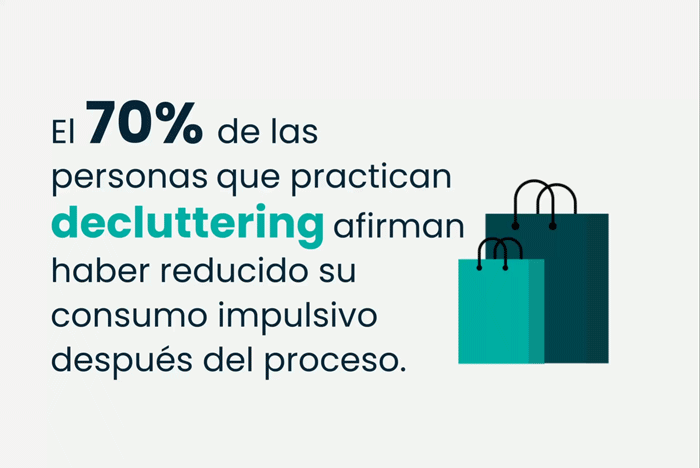
How to practice decluttering at home?
Tidying up our space not only transforms our home, but also our mind. Decluttering is a process that requires focus, patience and perseverance, but its benefits are worth it. Here are some tips to get you started in a simple and effective way:
- Evaluate and establish priorities: Before you start, look at each area of your home and ask yourself: which objects do I really use, which ones generate positive emotions for me, which things are just taking up space without contributing anything? Making a list will help you identify where to start and what things no longer have a place in your life.
- Start small: You don't have to empty the entire house in one day. Spend a few minutes a day on a small task, such as organizing a drawer, a shelf or a part of the closet. The key is not to do everything at once, but to move steadily.
- Be honest and practical: If you haven't used it in the last year, you probably don't need it. Keep only what really has a purpose in your life. If in doubt, ask yourself, "If I throw it away or give it away, will I really miss it?" Most of the time, the answer is no.
- Use the four-box method:
When you start to purge, sort the items into four categories:
- Junk: what is broken or in bad condition.
- Give away/donate: what is still useful, but you no longer need.
- Keep: what you really use or has special value.
- Relocate: what is out of place and needs a definitive location.
This method makes the decision easier and more visual. - Digitize what you can: Papers, documents, photos and receipts can take up a lot of unnecessary space. Use digital tools to scan and store what's important. Not only do you reduce clutter, but you also make it easier to access your information.
- Maintain order with daily habits: Dedicate 10 minutes a day to organize, keep things in their place and avoid accumulating new objects unnecessarily. A little daily effort prevents clutter from taking over your space again.
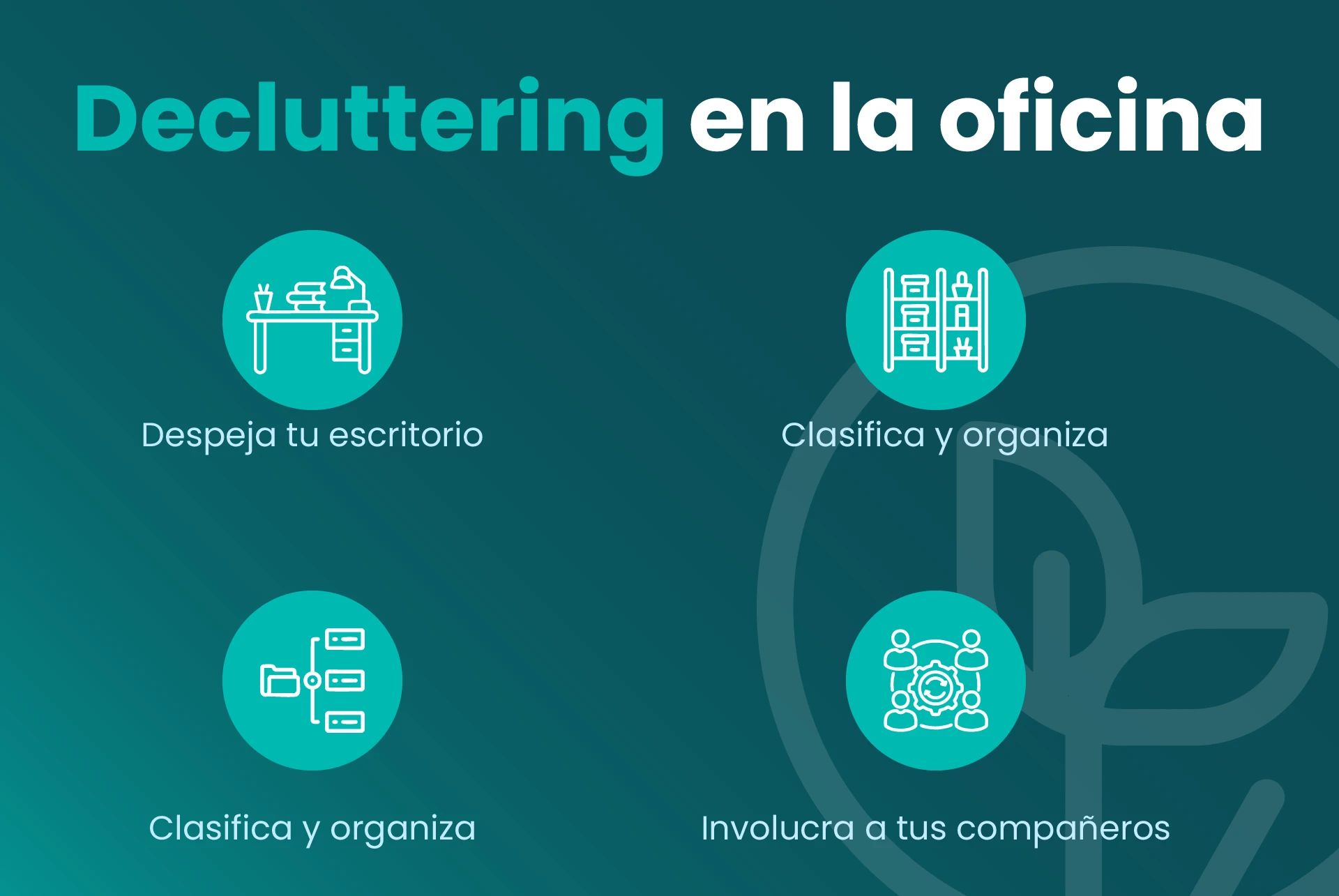
Apply decluttering in the office and work more clearly.
A tidy workspace not only looks better, it also improves productivity and reduces stress. We spend many hours in the office or in front of our desk, so keeping it uncluttered and organized can make a big difference in our performance and well-being.
If you feel that clutter is overwhelming you or that your desk is full of unnecessary things, here are some simple steps to practice decluttering your office.
Start by removing everything on your desk and evaluate what is really necessary. Photographs, old documents, empty mugs, tangled cords... If you don't use it every day or it doesn't add value to your space, it's time to let it go. Keep only the essentials, such as your computer, a notebook and a pen.
Review every document, material and object in your workspace. Separate what you really need from what is just taking up space. File important documents and get rid of those that are no longer relevant. If you have a lot of papers, try to digitize them to reduce the physical accumulation.
If you share an office, a good idea is to foster a culture of order and organization. You can establish specific days to clean and clear common spaces, recycle unnecessary materials and keep the work environment more harmonious and functional.
Clutter is not only physical. An inbox full of unread emails or a virtual desktop full of unorganized files can also affect your productivity. Take a few minutes to eliminate the unnecessary, sort documents and create well-organized folders.
Implementing decluttering in the office not only improves the work environment, but also increases productivity, since a tidy space allows better concentration and reduces time wasted searching for documents. It also helps to reduce stress, creating a clean and organized environment that promotes mental health and general well-being.
By eliminating distractions, decluttering fosters creativity, enhancing the ability to generate new ideas. This practice is valuable both at home and in the office, transforming chaotic spaces into more productive and pleasant environments. Initiating this process can be a significant step toward a more organized and balanced life.
Basic tips for successful decluttering
Decluttering isn't just about getting rid of stuff, it's about creating a space that truly reflects who we are and what we need. It may seem overwhelming at first, but with the right approaches, the process becomes easier and even liberating.
Here are some key tips to help you achieve a successful decluttering without complications:

Start with the easy stuff:
Don't dive straight into sentimental mementos or those boxes full of hard-to-release items. Start with simpler areas, such as a kitchen drawer, a shelf or the bathroom.
This will help you gain confidence and motivation to keep moving forward.

Ask yourself the key questions:
When in doubt about whether to keep something, ask yourself:
- Have I used it in the last year?
- Does it add value to my life?
- Does it make me happy or is it just taking up space?
If the answer is no, it's time to let go. It's not just about freeing up physical space, but mental space as well.

Give a second life to what you no longer use:
Not everything has to end up in the trash. Good clothes, books, furniture and even appliances can be useful for someone else.
Consider donating, giving them away or selling them before throwing them away. This way you reduce waste and help others.
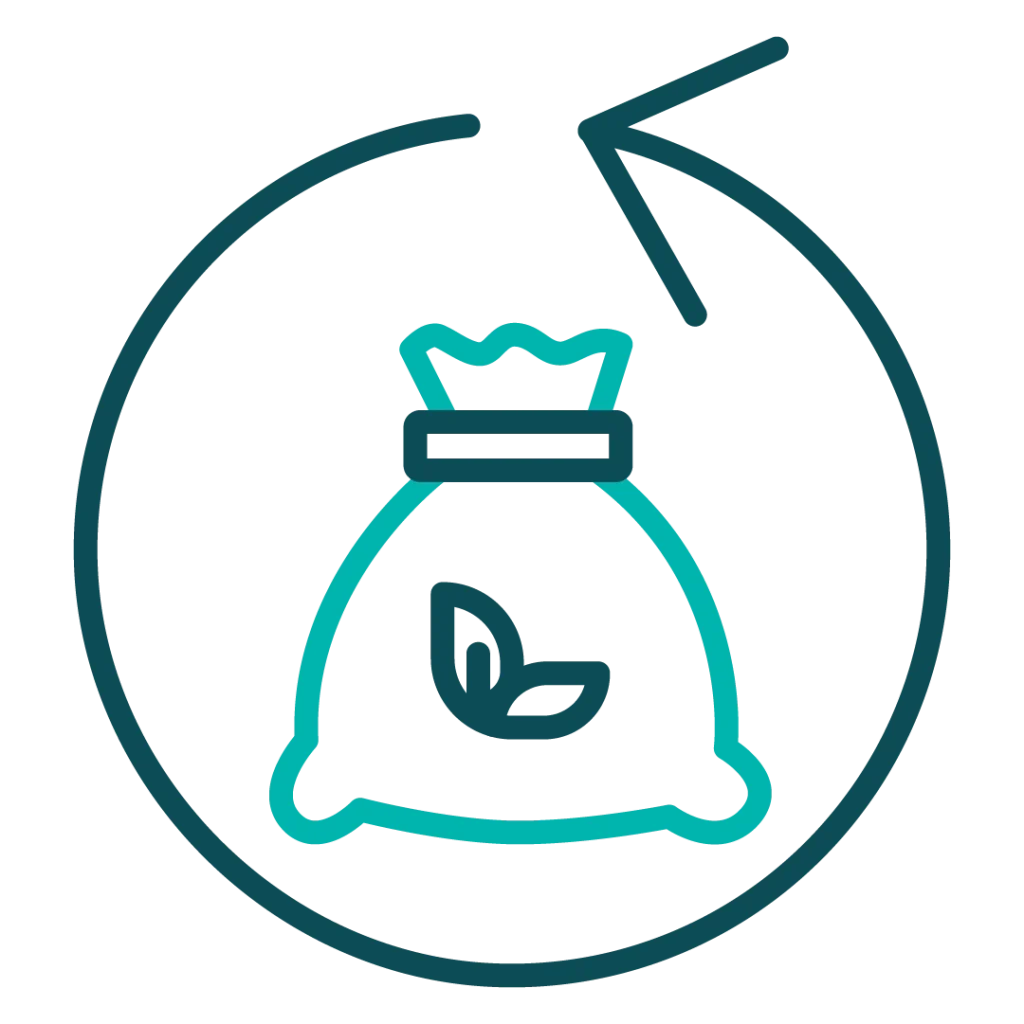
Beware of the "just in case":
That phrase is one of the main reasons why we accumulate unnecessary things. Be honest with yourself: if something has been sitting around for years "just in case," chances are you'll never use it.
Trust that if you ever need it, you can get it again.

Don't compare yourself:
Everyone has their own pace and style when decluttering. Don't put pressure on yourself to move as fast as someone else or to have a minimalist home overnight.
Celebrate every little step forward, because every object you let go of is a step towards a lighter, more functional space.
Conclusion on Decluttering
Decluttering is a transformative experience, not only physically, but also mentally. Freeing ourselves from clutter has made our spaces feel lighter, clearer, and that has been reflected in the way we live and work. By tidying up our homes and offices, we have created an environment where we can truly focus on what matters, without unnecessary distractions.
Sometimes, the most valuable thing is not what we have, but what we decide to let go, and in that process we have learned to be more conscious and responsible with our space and time. Practicing decluttering not only improves our well-being, it also helps us to enjoy a simpler and more balanced life, where the things that really matter have the space they deserve.

